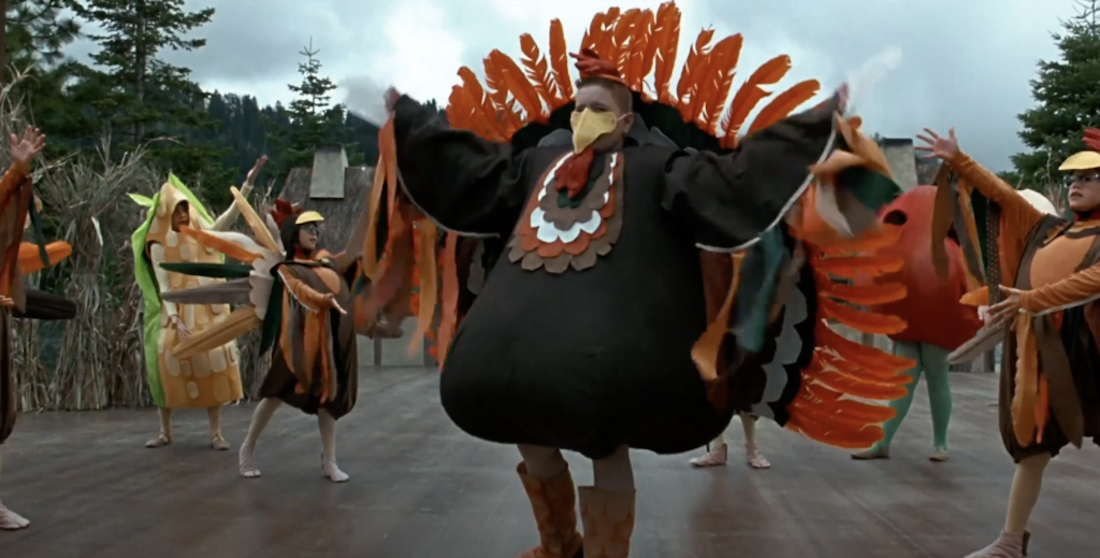ADDAMS FAMILY VALUES (1993)
Challenging Historical Mythos
The Addams Family is a family that I come back to consistently, when I need an example of a wholesome popular culture family with loving and progessive values. I’ve written before about why THE ADDAMS FAMILY (1991), directed by Barry Sonnenfeld, is a film that champions being yourself even when it rails against tradition and the societal norm. For all their creepy and their kooky, what they value most is honesty in being who you are and saying what you want. This trend of challenging traditions continues in the sequel, ADDAMS FAMILY VALUES (again directed by Barry Sonnenfeld), in ways you wouldn’t expect.
Sure, there is the main plot where Uncle Fester (Christopher Lloyd) marries a black widow named Debbie played by the brilliant Joan Cusack. Debbie has her sights on murdering Fester for his money, but in a hilarious series of events is fumbled at every turn. It is a stylish satire on the cultural obsession with true crime, specifically stories that involve the rich and famous lifestyle. But, let’s talk about that epic Thanksgiving scene at Camp Chippewa, shall we?
I don’t know if you could have this same scene in a movie today given the sociopolitical climate and still have it be as beloved. There are a lot of problems. With the Native Americans being depicted as vicious, references like “Red Man” in the “Eat Me” Thanksgiving song, and camp director Gary (Peter MacNicol) calling the Pilgrims “White Meat” and the Native Americans “Dark Meat,” there is so much cringe. It is my hope that we’ve moved past this kind of racist and derogatory colloquialism (we haven’t), but for 1993 it isn’t a surprise to see in a family film.
I would argue that all of this overt racism isn’t there by accident. It instead brings to the forefront how destructive a historical mythos can be in creating racist narratives not backed by truth. American Thanksgiving as we have been taught in schools where the Wampanoag people feasted in peace with the pilgrims is highly unlikely even with the most optimistic of views. Certain members of the Wampanoag people already spoke English, because they had dealt with white settlers before. The motivations behind this peace treaty and fictionalized harvest celebrated on this holiday have more to do with the indigenous people trying to prevent themselves from being colonized. National propaganda would have you think that the pilgrims brought civilization to indigenous people who desired it.
It is also pertinent that the camp directors cast the “undesirable” children as the Native Americans in the play. This includes many children of color, disabled children, the “ill-behaved” like Wednesday, and laughably, brunettes. They even chose to name Pocahontas as the lead role for the Native Americans even though it has nothing to do with this historical story. Pasting and cutting Pocahontas into the Thanksgiving story simply because it is a recognizable figure is the equivalent of saying Bruce Lee was in a Godzilla film just because he’s a famous Asian American. Amanda’s character, portrayed by Mercedes McNab, repeatedly makes jokes about the Native Americans not being civilized and her casual use of the word ‘savage’ is grotesque. Yet, the thing that makes it even more tragic is that this IS the traditional Thanksgiving story we’ve been passed down. This is the history that mainstream Americans believe to be true.
As the scene progresses and the Native Americans depicted in the play start to terrorize the Pilgrims after Wednesday’s speech, I cannot help but feel some relief and irony that this is closer to the truth of Thanksgiving than what is cultivated in our national memory.
It’s not okay that this entire Thanksgiving play is problematic, but we can return to this moment in the film and let it remind us of all the ways that history lies to us through propaganda. We can take what we’ve seen from Wednesday’s fictional revamping of the Thanksgiving story and let it inspire us to question imperialist authority and dig further into the real truth. History is not always going to be comfortable. In fact, most of it is terrible and is not something to feel good about. Nonetheless it remains one of the most important aspects of our education, because it teaches us how to be better and right our wrongs. Film can help us do that too. In a weird way, watching nasty tempered, entitled, little white kids run away in terror from the outcasts they’ve oppressed reminds me of the good fight before us in the hate filled world today.
I love ADDAMS FAMILY VALUES. I watch it every Thanksgiving, and what I am thankful for is that like the first one it quietly challenges our perception of tradition and truth.
This is the Addams way.




